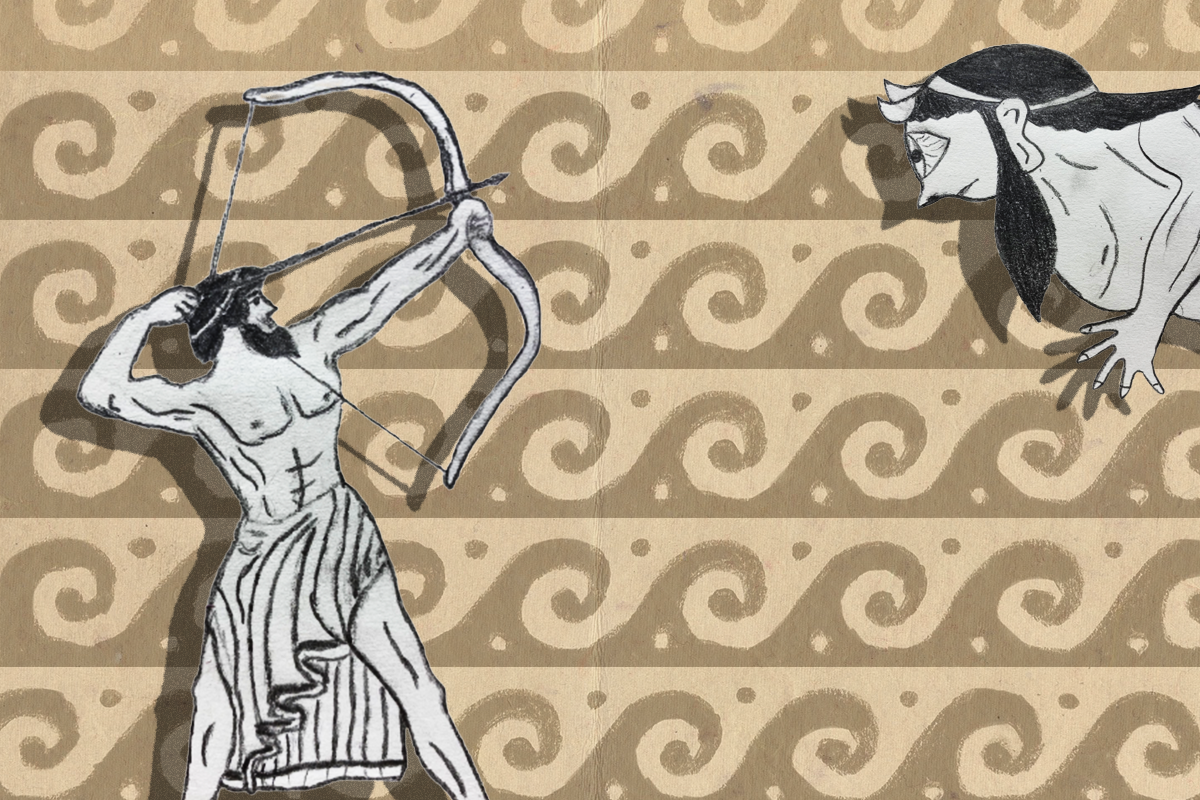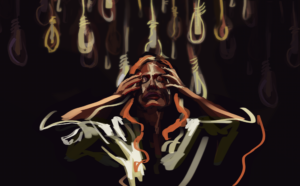Greek mythology is, quite literally, timeless. Dating back to Ancient Greece, the stories’ motifs are historically present in media, from Botticelli’s “The Birth of Venus” to the 1950 French film Orpheus. Even today, Rick Riordan’s Percy Jackson and the Olympians has been monumental in establishing the myth as gospel for Gen Z, with the series’s initial release in 2005 redefining middle-grade fantasy. Madeline Miller’s popular novels—The Song of Achilles (2011) and Circe (2018)—similarly encapsulate the tragedy and poeticism of Greek mythology. Broadway musical Hadestown (2016) brought the story of Orpheus and Eurydice to the stage, and songs like Gang of Youths’ “Achilles Come Down” (2017) draw lyrical symbolism from Greek characters. Centuries-old myths have taken the 21st century by storm, with no signs of slowing down.
Enter EPIC, the musical retelling of Homer’s Odyssey—arguably the most significant poem in Greek history—that has gone TikTok-viral over the past few months. Written and composed by Jorge “Jay” Rivera-Herrans, the musical is being released on streaming platforms in nine sagas, each an EP of four to five thematically connected songs. Rivera-Herrans manages to capture the revered 3,000-year-old Greek epic in a format that is both poignant and digestible.
The first concept album, The Troy Saga, introduces Odysseus (Rivera-Herrans) as he returns home to Ithaca after the decade-long Trojan War. Ultimately, the EP’s biggest strength is the personable feeling that permeates every song. Much of the lyrical narrative is spent characterizing Odysseus during the early stages of his journey; it’s essential that the audience can empathize with him beyond his title as king of Ithaca. Rivera-Herrans’ voice emanates both power and vulnerability: Odysseus’ belt wavers ever so slightly when the character is burdened with difficult decisions, and rings in a commanding tone during battle sequences.
Orchestral strings enhance this dramatic effect. Track 1, “The Horse and the Infant,” opens with electric bass layered atop a ticking clock, crafting an immediate sense of urgency and the grandiosity of the Greek epics. Drums, backing vocals, and crackling thunder might place the listener on a battlefield, but orchestral undertones are responsible for the swelling emotion in each song. Even in the album’s less aurally intense tracks (“Full Speed Ahead,” “Open Arms”), harp and acoustic guitar create a laid-back, transcendent tone.
“Horse” establishes Odysseus as a revered warrior, backed by the assertiveness of Rivera-Herrans’ robust vocals and the music’s energetic tone. “Just A Man,” however, pivots drastically. Here, we become familiar with Odysseus’ vulnerable side as he is faced with the impossible choice between killing an infant and losing his family. He sings, “I’m just a man who’s fighting for his life / Deep down I would trade the world to see my son and wife.” Even if we cannot see ourselves in Odysseus’ position, we can certainly understand what it means to be selfish in the name of love.
The final track, “Warrior of the Mind,” presents Odysseus as a man clever enough to warrant Athena’s patronage. By separating Odysseus’ key traits into different songs, Rivera-Herrans has ensured that we are gradually introduced to the protagonist’s technicolor character as the musical progresses. It’s more effective than dedicating solely one song to characterization and allows Odysseus to unfold with intimate familiarity. The result is a story that is equally plot- and character-driven.
In contrast to its predecessor, The Cyclops Saga goes dark with a more electric tone. The sound is reflective of the chronicle’s change in mood, particularly during the battle with Polyphemus, the infamous cyclops. But where The Troy Saga shines, Rivera-Herrans’ second album lets listeners down with the opening number. “Polyphemus” epitomizes the biggest pitfall of both albums—static dialogue chosen over an engaging refrain. In trying to maintain the integrity of a nuanced plot, Rivera-Herrans sacrifices the flow of a dynamic melody by making simple instrumentation a backing track to lacking prose. This may be explained by EPIC’s video game roots—Rivera-Herrans has cited anime and video games as inspiration for the EPs. In that regard, “Polyphemus” is more like a cut scene used purely to advance the plot. But this is a musical concept album, and the opening number would have been stronger if it was as bountiful as its companions.
The rest of the album is where The Cyclops Saga redeems itself. “Survive” integrates an accelerated tempo and electric instrumentation, manipulating the backing track of “Horse” to mimic the vigor of a battle cry. “Remember Them” takes listeners deeper into the EP’s emerging theme of sacrifice on the battlefield; it’s the darkest track on the album, a blend of rock and theater with electric guitar riffs and low notes. Despite the lyrics conveying a palpable sense of vengeance, our hero sets a limit on the bloodshed, choosing mercy in a world where killing is the easy way out. The musical emphasis on this decision, which comprises over a third of the song, fleshes out Odysseus’ very human struggle with morality.
I love the EPIC musical thus far. I think it’s clever, refreshing, and nicely executed. But it’s only the latest addition to a long line of mythology-inspired media, which raises the question—why does it feel novel if it’s a retelling of an epic thousands of years old?
Greek myths, at their core, embody the intimately moral questions and mortal elements of the human experience played out by impossible, larger-than-life characters: heroes with a fractured moral compass and an unyielding sense of martyrdom, gods and goddesses equally likely to shake the skies and squabble among themselves, and nymphs who tricked humans and monsters that devoured them. Greek mythology has taught us about hatred and love, loss and acceptance, life and death. While these myths may no longer help explain the world around us as they did for the ancient Greeks, their lessons remain ever-salient. They take what we fear about being human—mortality, failure, legacy—and throw it back in our faces, softening the blow with mystical creatures and surreal imagery. That’s why Greek mythology persists, and that’s what EPIC embodies most.





